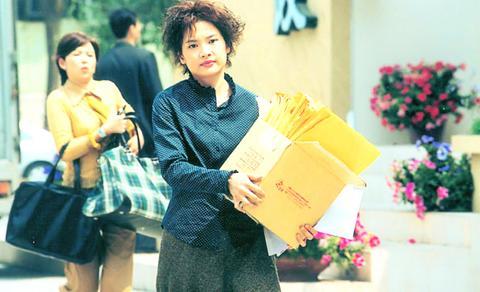Robinson is a well off, middle-aged man selling real estate in the urban jungle of Taipei. He deals with giant-budget projects and meets with all kinds of business tycoons. But one thing he is unable to cope with is a settled home and relationship in Taipei.
He sells people houses, as well as a sense of home and happiness, but he owns no houses and lives by himself in a hotel room.

PHOTO COURTESY OF CMPC
Robinson is surrounded by four women. Hsiang-chi is his co-worker. They like to share childhood memories and dreams with each other.

PHOTO COURTESY OF CMPC
Kuei-mei is another co-worker who always has men troubles. Robinson likes to comfort her and politely flirts with her when she's down.
His girlfriend Feng-Shu sometimes visits him at the hotel. But he often stands her up out of pure carelessness. And there is Sin-jie, the girl working on the reception desk at the hotel. She greets and chats with Robinson everyday and advises Robinson to call his girlfriend.
Coincidentally, what happens in the film Robinson's Crusoe (
But during the shooting of the film, the two agreed to break up, exactly mirroring what happens in the film toward the end.
As for director Lin Cheng-sheng, who wrote the script of Robinson, he admitted the film was a reflection on his mid-life crisis. After finishing editing with his long-term co-worker and wife Ke Shu-ching (
When Chang and Dai both appeared at Tuesday's press conference for Robinson's Crusoe, they were immediately surrounded by dozens of reporters, inquiring after their love lives. Chang and Dai only reluctantly agreed to take a photo together.
"Please focus on the film not their personal lives. The fact that I'm willing to talk about my marriage doesn't mean that my actors should talk about their own lives as well," said Lin Cheng-sheng, trying to rescue the two embarrassed actors from the media chase.
With the release of Robinson's Crusoe this weekend, Lin said that he hoped the reception it gets is as good as that at Cannes, France, in May, when the French media were effusive and compared it favorably with Edward Yang's (楊德昌) YiYi (

The canonical shot of an East Asian city is a night skyline studded with towering apartment and office buildings, bright with neon and plastic signage, a landscape of energy and modernity. Another classic image is the same city seen from above, in which identical apartment towers march across the city, spilling out over nearby geography, like stylized soldiers colonizing new territory in a board game. Densely populated dynamic conurbations of money, technological innovation and convenience, it is hard to see the cities of East Asia as what they truly are: necropolises. Why is this? The East Asian development model, with

June 16 to June 22 The following flyer appeared on the streets of Hsinchu on June 12, 1895: “Taipei has already fallen to the Japanese barbarians, who have brought great misery to our land and people. We heard that the Japanese occupiers will tax our gardens, our houses, our bodies, and even our chickens, dogs, cows and pigs. They wear their hair wild, carve their teeth, tattoo their foreheads, wear strange clothes and speak a strange language. How can we be ruled by such people?” Posted by civilian militia leader Wu Tang-hsing (吳湯興), it was a call to arms to retake

This is a deeply unsettling period in Taiwan. Uncertainties are everywhere while everyone waits for a small army of other shoes to drop on nearly every front. During challenging times, interesting political changes can happen, yet all three major political parties are beset with scandals, strife and self-inflicted wounds. As the ruling party, the Democratic Progressive Party (DPP) is held accountable for not only the challenges to the party, but also the nation. Taiwan is geopolitically and economically under threat. Domestically, the administration is under siege by the opposition-controlled legislature and growing discontent with what opponents characterize as arrogant, autocratic

When Lisa, 20, laces into her ultra-high heels for her shift at a strip club in Ukraine’s Kharkiv, she knows that aside from dancing, she will have to comfort traumatized soldiers. Since Russia’s 2022 invasion, exhausted troops are the main clientele of the Flash Dancers club in the center of the northeastern city, just 20 kilometers from Russian forces. For some customers, it provides an “escape” from the war, said Valerya Zavatska — a 25-year-old law graduate who runs the club with her mother, an ex-dancer. But many are not there just for the show. They “want to talk about what hurts,” she